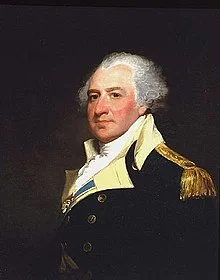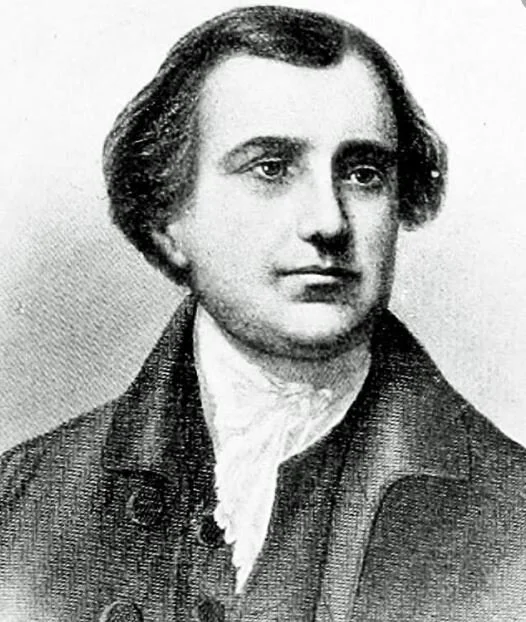Edmund Randolph Disappoints Washington
Edmund Randolph was one of the major players in the American Founding.
A leader of Revolutionary Virginia, he was Governor of that State when he attended the Constitutional Convention.
Despite refusing to sign the Constitution, Randolph was chosen by President Washington to be the first Attorney General of the United States.
Edmund Randolph
When the American Revolutionary War broke out, Edmund Randolph was a 22-year-old lawyer from Williamsburg, Virginia. Like many wealthy families, the Randolph’s were split on which side to join.
Edmund’s father, John Randolph, remained Loyal to the King, forever dividing the two men. Peyton Randolph, our subject’s uncle, was a colonial leader who had already attended the First Continental Congress.
Young Edmund sided with his uncle and quickly signed up for the Continental Army. He was immediately appointed as an aide-de-camp to General Washington, a family friend.
Governor
Early into his army service, Edmund’s uncle Peyton passed away. Now the patriarch of the Randolph family, Edmund returned home to take care of his uncle’s will.
Randolph spent most of the next decade in private law practice, though he did sit for three years in the Continental Congress.
By 1786, the Revolutionary War was complete and Edmund was elected as Governor of Virginia. As the largest State, Virginia’s Governor seat was one of the most powerful positions in the new nation. Randolph used the power of this office to lend weight to two meetings, the Annapolis Convention and the Constitutional Convention.
The Constitution
At the Constitutional Convention, Edmund presented the Virginia Plan. Although we now know this plan was primarily devised by James Madison, it was often referred to in Congress as the ‘Randolph Plan.’ While many changes would be made to the document throughout the summer of 1787, Edmund, still only 34, had given the Constitutional Convention direction.
What is interesting about Randolph is, despite his large amount of participation in creating the Constitution, he refused to sign the document upon it’s completion. He had several fears about the new government, most notably the ability of the Supreme Court to override the laws of the States.
Because he was still Governor, Randolph was responsible for calling together and sitting as chairman of the Virginia Ratifiying Convention. He oversaw a hotly contested debate and, along the way, changed his mind about the document and decided to support it. This change assisted in swaying the vote to approve ratification.
Washington’s Cabinet
After taking office, George Washington appointed members of the first Cabinet. Edmund Randolph was chosen as the first Attorney General of the United States.
There are many reason for this, one of which was trust. Randolph handled several legal issues for Washington while he was away at war and George felt he could count on the young man.
When Thomas Jefferson resigned as Secretary of State, Randolph (his cousin) was asked to replace him.
During his time in the State Department, Randolph was responsible for negotiations of the Jay Treaty (though Alexander Hamilton wrote most of the instructions sent to John Jay).
Edmund had reservations regarding the Treaty and voiced them to Washington.
Washington was considering Randolph’s suggestions when a letter from France was intercepted and given to the President. This letter implicated that Edmund had been discussing the turmoil in the Cabinet with the French Ambassador.
Washington felt betrayed.
During a Cabinet meeting, in front of the other Secretaries, George handed Edmund the letter.
Embarrassed, Randolph resigned immediately.
Later Years
Edmund Randolph spent the next decade successfully running his private law practice.
He reemerged on the national scene when he was hired by Aaron Burr as a defense attorney in his Treason Trial (for trying to invade Spanish Territory, not shooting Hamilton). Randolph managed to have the defendant exonerated, though Burr’s public reputation was tarnished.
This was the end of Edmund Randolph’s participation in government. The young revolutionary had grown old and, after losing his beloved wife, was content with peaceful retirement.
Randolph’s influence in early America has long been overlooked due to his resistance to the Constitution as well as his disappointment to Washington. Edmund was, however, one of the major players in the American Founding.
To learn more about Randolph, consider reading ‘Edmund Randolph: A Biography.’ It goes into much more details than this article and really establishes what an important part of early America he was. It might be tough to find at the library so consider purchasing it through our affiliate Amazon with the link below.
If you are new to this site, you might want to subscribe to the email list to get a new article every morning.






